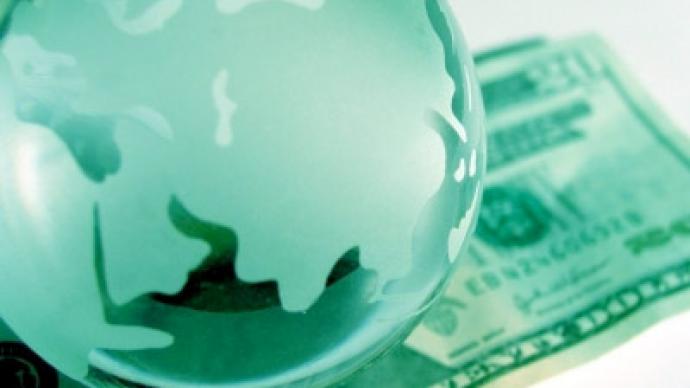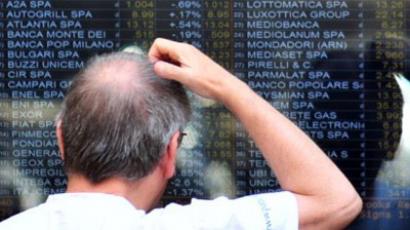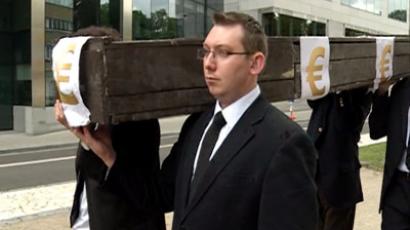Russia’s economy in the face of global volatility: Yaroslav Lissovolik

With the global economic outlook clouded by the Eurozone debt crisis, the end of QE2 in the US and mounting concern about whether China can control its inflation Business RT spoke with Yaroslav Lissovolik, Chief Economist at Deutsche Bank.
RT: How likely is it that a major sovereign default will occur in the Eurozone, Russia’s largest trade partner?Greece, Portugal, Ireland and now Italy?What would be the impact on the impact on the European banking system? The European Economy? What are the implications for Russia?YL:“In my view for this year we are unlikely to see a fully-fledged default on the part of the European countries.I think there is very strong political will in Europe not to allow that kind of macabre scenario to take place.However these risks of sovereign debt are likely to be, are likely to persist for quite some period of time, probably for the next several years at least.And those factors will continue to weigh on markets.If a sovereign default were to take place in one of the countries then the main risk would be a domino effect, whereby from one country to the other you would have that spill over of the crisis take place, and then the real danger is that if something like that happens, it could go onto larger economies of the Eurozone that represent a significant weight, not just within Europe, but also within the global economy.And then the implications become far more serious, not just for Europe, but for Russia as well potentially.And one of the implications most likely of a downturn like that would be a weaker euro, hence a weaker rouble, and accordingly that would be a negative factor Russia’s own macroeconomic stability.Because with a weaker rouble we are likely to see significant capital outflow.” RT: What are the implications of the end of QE2 in the United States for Russia?Will it lead to a reduction in inflationary pressure?What will be the impact on commodity and energy prices? YL:“Yes I think there will certainly be a moderating effect from the end of QE2 on the level of commodity prices.It is believed in some parts of the financial markets that the end of QE2 would be a factor that would deflate some of the bubbles out there in the global economy.But I don’t think that this factors is as potent, and anyway, we are potentially likely to see QE3 now.And that essentially means the dissipation of QE2 might not be such a decisive factor for the global economy after all.But I think certainly for the stock markets this is a very important factor, and if liquidity continues to be significant on the back of the stimulus measures, whether QE2 or, after that, QE3, this is certainly a factor that supports the markets, globally equity markets.If there was the abrupt withdrawal of this liquidity, with the cessation of the QE2 and QE3, for example, then we would have negative implications for the stock markets globally and for Russia as well.”RT: China has been making serious efforts to bring its inflationary problems under control with rate increases and reserve requirements since 2010 but 2Q GDP and inflation numbers were stronger than expected.Is this likely to see a soft landing for the Chinese economy?What are the implications for Russia of a hard landing?YL:“Yes, with respect to China our scenario is that most likely we will see a soft landing, and the official forecast that we have is 9.5% GDP growth for China in 2011, which means essentially some deceleration from the previous year, but still a relatively high pace of growth that does not carry with it any negative implications that a lot of the other observers do foresee for China.We don’t think that China, per se, is a major vulnerability with respect to the global economy at this stage.But at the same time we do recognise that inflation is high, it is higher than a lot of the observers expected and it will take measures from China to reduce the level of inflation going forward which may have a moderating effect on growth.But then again we see that growth being close to 10% in the course of this year.”RT: The 2008 capital outflow in the wake of Lehman Brothers left corporate Russia exposed needing to fund massive liabilities to international lenders.Would a similar situation be exposed in 2011?Would there be a need for massive government bailouts for either the financial system or major Russian borrowers as there was in 2008?YL:“I don’t really see at this stage something that would be reminiscent of the Lehman episode, that we have seen in the US before.That would necessitate a full-fledged second wave of a crisis, and I think if there is such a wave out there in the global economy, most likely it would be engendered by problems in Europe.But for the time being, I think for this year, Europe has the political will and the resources to avoid such a cataclysmic scenario.Again vulnerabilities may persist for the next several years, but for this year I don’t foresee a really abruptly negative scenario, along the lines of what we saw in the first wave of the crisis, when we all remember what happened to commodity prices, what happened with liquidity, and bankruptcies.I don’t see at this stage the global economy performing such an act this year.”RT: What did the Russian Finance Ministry, Government, Central Bank learn from 2008 meltdown?How would it change things in the event of another major slump?What did it get right?YL:“I think lessons are learned and we can see this from how Russia went through the crisis of 2008-2009 compared to 1998.In 1998 remember there were defaults, there were non-payments, there were capital controls, there was a massive one off devaluation.During the most recent crisis Russia was responsible enough to accumulate significant reserves to conduct its fiscal policy in such a way as to significantly soften the impact of the crisis for the wider strata of the population, and that is very important.And I think after this crisis there will also be lessons learned I think, and one of the lessons is that bailouts for some of the banks that we have seen during the most recent crisis were not efficient and probably those resources were not very well spent so to say.And there is such a problem as moral hazard, a free rider problem, that needs to be taken into account in future anti-crisis policies of the Russian government.”RT: In terms of its fiscal reserves and budgetary position, how well prepared is Russia for further instability – Reserves are back near where they were in mid 2008, the budget is nearly balanced with oil at about $100/bbl – does Russia have a safety net?YL:“There is a reserve that has been built up, and currently we have more than $120 billion in the two oil funds.Those resources can be used to further attenuate any crisis that comes Russia’s way.Furthermore there are more than $500 billion in FX reserves that Russia to try to deal with any volatility on the exchange rate front. Still however, it needs to be taken into account that these levels of reserves are lower than the ones that Russia had before the first wave of the crisis in 2008.So the level of the reserves is lower and if the severity of the crisis is as stark as during the first wave of the crisis, it may make matters somewhat difficult.But the reserve is there, if the lessons are learned, if these resources that are left are used more efficiently then I think that Russia is in a position to again be able to withstand another wave of the crisis that may come its way.”RT: What would be the implications for a period of further downturn or volatility for key strategic Russian government economic policies such as economic diversification, closer integration into the global economy, privatisation and development of the domestic financial system?YL:“I think the concern is that if there is any crisis and volatility that is coming Russia’s way then some of the longer term goals will become even more longer term. Some of the very pressing issues such as diversification will probably be again postponed and that would be a major problem then.Because inevitably during the crisis, what you typically have is that the government has to deal with some of the immediate threats such as the exchange rate, such as the budgetary situation.So that’s the threat.The hope is that the government will gradually establish a framework, a systemic framework, of decision making, of policy making, whereby the framework of the economy is less vulnerable to swings and volatility and capital flows.Essentially the task that the government currently sets for itself is to establish a six year framework, for the next six years, that would not change very significantly whether there is a crisis or not, and that is the biggest challenge for the government right now.To set the rules and to stick by them, even if conditions, external conditions, become very challenging.”














